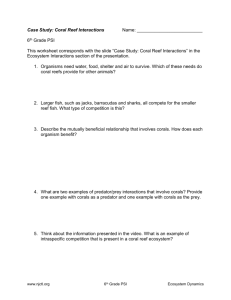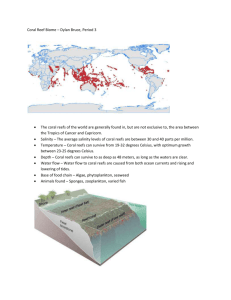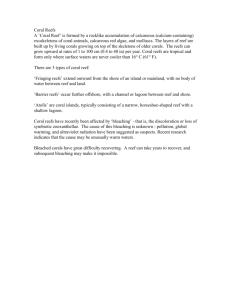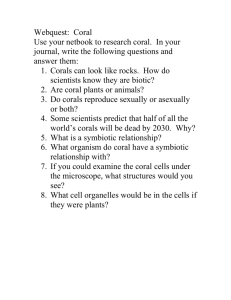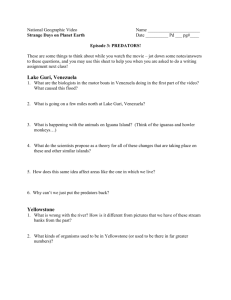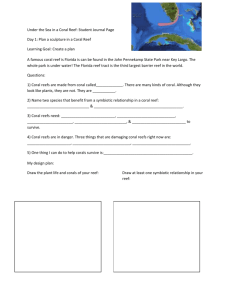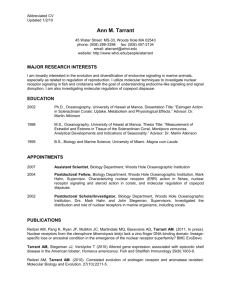Draft syllabus Biology and Ecology of Coral Reefs Instructors: Ann
advertisement
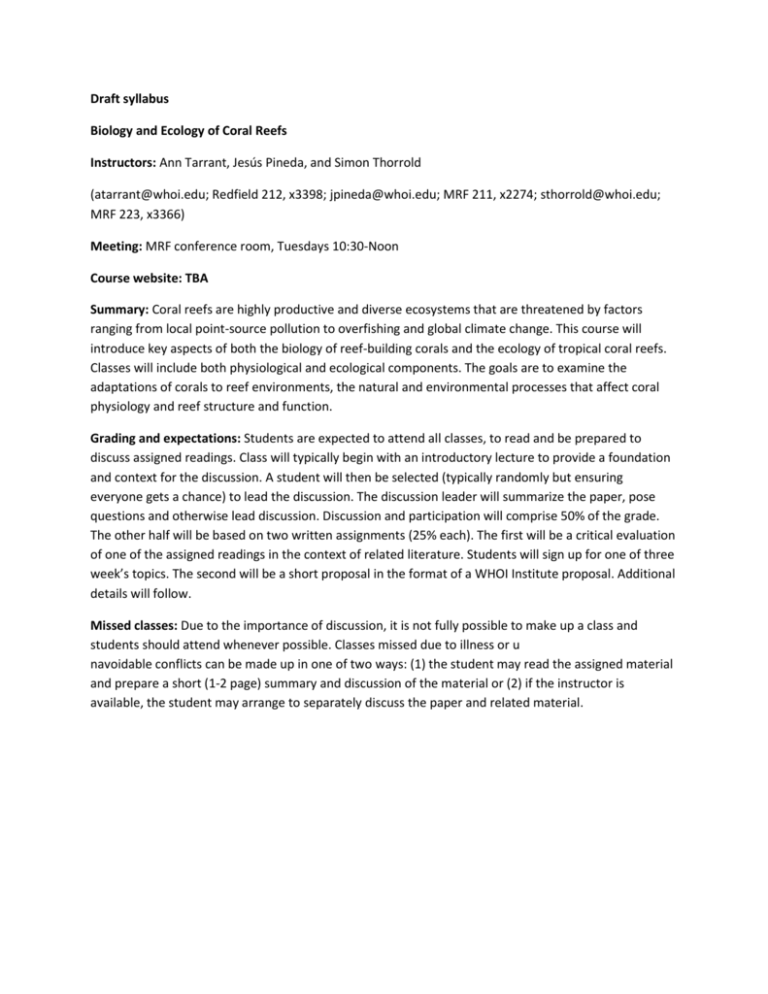
Draft syllabus Biology and Ecology of Coral Reefs Instructors: Ann Tarrant, Jesús Pineda, and Simon Thorrold (atarrant@whoi.edu; Redfield 212, x3398; jpineda@whoi.edu; MRF 211, x2274; sthorrold@whoi.edu; MRF 223, x3366) Meeting: MRF conference room, Tuesdays 10:30-Noon Course website: TBA Summary: Coral reefs are highly productive and diverse ecosystems that are threatened by factors ranging from local point-source pollution to overfishing and global climate change. This course will introduce key aspects of both the biology of reef-building corals and the ecology of tropical coral reefs. Classes will include both physiological and ecological components. The goals are to examine the adaptations of corals to reef environments, the natural and environmental processes that affect coral physiology and reef structure and function. Grading and expectations: Students are expected to attend all classes, to read and be prepared to discuss assigned readings. Class will typically begin with an introductory lecture to provide a foundation and context for the discussion. A student will then be selected (typically randomly but ensuring everyone gets a chance) to lead the discussion. The discussion leader will summarize the paper, pose questions and otherwise lead discussion. Discussion and participation will comprise 50% of the grade. The other half will be based on two written assignments (25% each). The first will be a critical evaluation of one of the assigned readings in the context of related literature. Students will sign up for one of three week’s topics. The second will be a short proposal in the format of a WHOI Institute proposal. Additional details will follow. Missed classes: Due to the importance of discussion, it is not fully possible to make up a class and students should attend whenever possible. Classes missed due to illness or u navoidable conflicts can be made up in one of two ways: (1) the student may read the assigned material and prepare a short (1-2 page) summary and discussion of the material or (2) if the instructor is available, the student may arrange to separately discuss the paper and related material. Provisional Schedule: Sept. 9 Tarrant Introduction Species diversity hypotheses at local and regional scales Hughes TP, Bellwood DR, Connolly SR. 2002. Biodiversity hotspots, centres of endemicity and the conservation of coral reefs. Ecology Letters 5:775-784) Johnson, KG, Jackson JBC, Budd AF. 2008. Caribbean reef development was independent of coral diversity over 28 million years. Science 319(5869): 1521-3. Sept. 16 Tarrant Sign up for Assignment #1 topics/weeks. Nutrient uptake, eutrophication, and coral-macroalgal interactions Burkepile, DE, Hay, ME. 2006. Herbivore vs. nutrient contol of marine primary producers: context-dependent effects. Ecology 87(12): 3128-39. Sept. 23 Tarrant (Neal Cantin) Physiology of coral-algal symbiosis Stat M, Morris E, and Gates RD. 2008. Functional diversity in coral-dinoflagellate symbiosis. PNAS 105(27): 9256-61. Sept. 30 Tarrant Ecology of Coral Bleaching Rodrigues L and Grottoli AG. 2007. Energy reserves and metabolism as indicators of coral recovery from bleaching. Limnol. Oceanogr. 52(5): 1874-82.) Oct. 7 Pineda Oceanography: reefs circulation and physical/chemical water properties Oct. 14 Pineda Larval dispersal and transport Oct. 21 Tarrant Coral reproduction and hormone-like signaling in corals Oct. 28 Tarrant Chemical communication and settlement cues Nov. 4 Tarrant (Assignment 2 topic due, 1 paragraph) Coral calcification (individual and reef scale) and potential effects of ocean acidification November 11 – No class, Veteran’s Day. Nov. 18 Tarrant TBA* Nov. 25 Thorrold (Assignment 2 due) Coral reef fish ecology Dec. 2 Thorrold Marine protected areas and conservation of coral reef Dec. 9 Tarrant TBA* To be selected, in part based on class interest. Potential topics include, zonation, disturbance and recovery, herbivory, and bioerosion.

